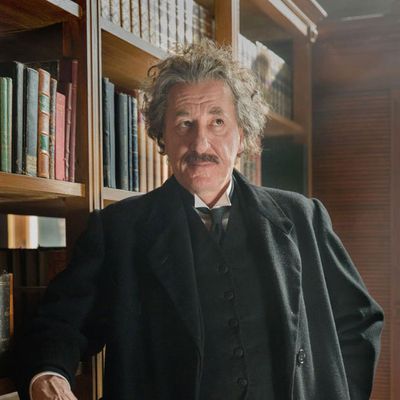
Once upon a time, a biopic about Albert Einstein — particularly one starring Geoffrey Rush and co-produced by Brian Grazer and Ron Howard, who also has a directing credit on the project — would have been a major motion picture and part of the flurry of end-of-the-year Oscar conversation. In 2017, it’s a TV show because, as we all know, television is now regularly bathed in just as much prestige as the award-season movie slate. TV series: They’re the new movies! Except they’re not. They’re works of television, a perfectly respectable and exciting medium that just happens to have more high-profile, esteemed Hollywood creators working in it than ever before.
Hence, Genius — a look at the life of Albert Einstein, played in his later years by Rush and in his earlier ones by Johnny Flynn — is a ten-episode series that marks the first foray into original scripted fare for National Geographic. Given the vast scope of its story, adapted by showrunner Ken Biller and writer Noah Pink from Walter Isaacson’s book Einstein: His Life and Universe, television feels like a more accommodating home for it. If anything, ten hours may not be enough to capture the potentially too vast narrative ambitions established in its first two episodes.
“The distinction between the past, present, and future is but a stubborn illusion,” Einstein says during a lecture in episode one, and the way Genius plays with time and space seems to prove that point. The first episode, directed by Howard, toggles frequently between time periods and settings, primarily the 1890s, when young Einstein is at odds with his father and determined to study science and mathematics at Zurich’s Polytechnic Institute, and the 1920s, when the now-famous professor is wrestling with the rise of the Nazis, who see Einstein as an anti-establishment threat that should be eliminated. In what feels like an attempt to establish that this drama will not be some staid, multipart physics lesson, Genius’s first glimpse of Einstein arrives in a sex scene, in which the recognizably frizzy-haired scholar of the early ’20s is banging his secretary Betty in his office before a class. (Nat Geo: where we take the notion that people love science extremely literally.) “Move in with me, ” he begs her afterward; she protests, noting that he is married. So Einstein wasn’t just a master at coming up with equations that explain the speed of light. He was also a bit of a Don Draper.
The women in the scientist’s life — an early girlfriend, Marie (Shannon Tarbet), his second wife, Elsa (Emily Watson), and his first, Mileva Marić (Samantha Colley) — are nearly as central to Genius as the genius himself. The second episode, which focuses entirely on the blossoming relationship between Albert and Mileva as young students, is as much about her as it is about him. There’s a generosity in this — Mileva is as smart as Albert, maybe even smarter, and the series admirably takes the time to highlight how much harder she has to work as a Serbian girl who’s always the only female in every class. But such sidebars also raise questions about the show’s focus. Is Genius basically Einstein and His Women? Or is it Einstein: Escape From the Nazis? Or is it a show that’s most interested in how this revered man’s beautiful mind works, something the series visually captures in scenes directed by Howard where Albert conjures hologram-style images of the sun and its shafts of quickly traveling light? The answer in these initial episodes appears to be all of the above. It’s hard to know without seeing more of Genius whether it tries to serves too much for any viewer to fully chew and digest. From the outset, it’s clear that its plate is very full.
Rush, as previously established by the internet, certainly looks the part and delivers a believable, strong performance, albeit one that’s somewhat limited in the early installments. Flynn, best known as the lead in the series Lovesick, a.k.a. the show formerly known as Scrotal Recall, and for playing Chloë Grace Moretz’s boyfriend in Clouds of Sils Maria, gets more screen time in episodes one and two. His young Einstein — which, for the record, will never be confused with Yahoo Serious’s Young Einstein — is a passionate figure who is endearing, and also stubborn, and sometimes careless. Flynn makes a persuasive case that Einstein, a longtime fixture in college dorm-room posters, may have deserved to be a pinup boy for sexier reasons, too. (Nat Geo: where our Einstein is hot.)
Genius is, overall, handsome and reasonably compelling, but it doesn’t necessarily grab the viewer in a way that makes one anxious to immediately see episode three. And that’s practically a necessity these days, especially in a month that is putting such extreme strain on our DVRs. It’s a drama made with obvious care that could add up to something great. But it’s hard to know that for sure until we see the whole complicated equation in its entirety.





